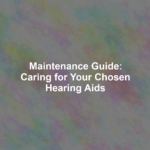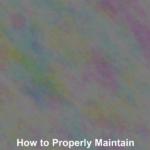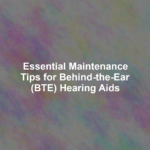Nearly 15% of adults in the United States report some trouble with hearing, and many of you rely on hearing aids for daily communication. Ensuring these devices operate effectively isnG??t just about battery life; itG??s about maintaining their delicate components with care and precision.
YouG??ve made the investment in your hearing, now itG??s crucial to protect it by adhering to a few maintenance tips that can prolong the life and performance of your hearing aids. From establishing a daily cleaning routine to understanding the nuances of moisture protection, each step you take can significantly impact the quality of your auditory experience.
LetG??s consider the essential practices that will keep your chosen hearing aids in optimal condition, and why skipping even one can lead to preventable issues that you definitely want to avoid.
Daily Cleaning Routine
To ensure your hearing aid functions optimally, establish a daily cleaning routine that removes earwax, debris, and moisture. YouG??ll need a soft, dry cloth and a gentle brush specifically designed for hearing aids. Start by wiping the exterior of the device to clear away any earwax or dirt thatG??s accumulated throughout the day. DonG??t forget to handle your hearing aid with care to avoid any accidental damage.
Next, use the brush to gently sweep away any debris from the microphone ports and vent openings. ItG??s crucial to do this delicately to prevent pushing earwax deeper into the device, which could impair functionality. If your hearing aid has a wax guard, check it daily and change it if you notice itG??s clogged or dirty. This little filter is your first line of defense against wax buildup inside the hearing aid.
Lastly, open the battery compartment and remove the batteries each night. This not only prolongs battery life but also airs out the compartment, reducing moisture buildup. If you live in a humid climate or sweat a lot, consider using a dehumidifier specifically designed for hearing aids to keep them dry and well-functioning.
Battery Care and Replacement
Proper battery maintenance not only ensures peak performance of your hearing aids but also extends the lifespan of the power source itself. YouG??ve got to stay on top of it to get the best out of your device.
HereG??s a snapshot of what you should do:
-
Avoid exposing them to extreme cold or heat, which can reduce battery life.
-
Keep them away from coins, keys, or other metal objects to prevent short-circuiting.
-
Turn off your hearing aids when youG??re not using them.
-
This simple step can save you a lot of power and money in the long run.
-
Check battery contacts regularly.
-
Ensure theyG??re clean and free from debris.
-
If you notice any corrosion, gently clean the contacts with a dry cloth.
Remember, when itG??s time for a replacement, handle your batteries with care:
- Wash your hands before changing batteries to avoid transferring grease or dirt.
- Dispose of old batteries properly.
- Find a recycling program or a designated disposal facility.
- DonG??t throw them in the trash as they contain materials that can harm the environment.
Moisture Protection Strategies
Regularly safeguarding your hearing aids from moisture is crucial for their optimal performance and longevity. You know that water and electronics donG??t mix, so itG??s essential to keep them dry. If youG??re caught in the rain, take a moment to gently wipe down your hearing aids with a soft, dry cloth.
Always remove your hearing aids before showering, swimming, or any activity where they could be exposed to water. ItG??s a simple step that can prevent a world of trouble. Moreover, consider using a dehumidifier designed for hearing aids. These devices can help dry out any moisture thatG??s accumulated during the day, especially if you live in a humid climate or sweat a lot.
DonG??t forget to open the battery compartment at night. This not only allows the compartment to air out but also prolongs the battery life. And if your hearing aids do get wet, remove the batteries immediately. Then, place the hearing aids and the batteries in a dry, warm place to let them air out thoroughly before using them again.
Safe Storage Practices
Continuing with your hearing aid care, letG??s focus on how to store them safely when not in use. Proper storage is critical to extend the life of your hearing aids and ensure theyG??re ready when you need them. HereG??s how you can keep them safe and sound:
- Choose a dry, cool place away from direct sunlight to prevent damage.
- Keep them out of reach of pets and children to avoid accidental damage or ingestion.
To give you a clearer picture, consider these storage tips:
-
At Home:
-
Use a dedicated hearing aid container or dehumidifier box.
-
Place it on a high shelf or in a locked drawer.
-
On the Go:
-
Carry a hard-shell case to protect against physical damage.
-
Avoid leaving them in a hot car or near water.
Regular Professional Check-Ups
Just as youG??d consult a doctor for a check-up, your hearing aids benefit immensely from periodic professional evaluations. ItG??s crucial to schedule regular visits with your audiologist to ensure your devices are functioning optimally. These experts can assess your hearing aids for any signs of wear and tear that you mightnG??t notice.
During these check-ups, your audiologist will also adjust your hearing aids based on any changes in your hearing ability. ItG??s not uncommon for your hearing to change over time, and your hearing aids must adapt to these changes to provide you with the best possible sound quality.
YouG??ll also learn about new advances in hearing aid technology during these visits. Your audiologist can inform you about the latest features and accessories that could enhance your hearing experience. They might even update the software of your hearing aids, if applicable, to keep them running smoothly.
Conclusion
Remember to keep your hearing aids in top shape by sticking to a daily cleaning routine and taking care of the batteries. Protect them from moisture and always store them safely when youG??re not using them.
DonG??t forget to schedule regular check-ups with your audiologist to ensure theyG??re working perfectly. By following these simple tips, youG??ll extend the life of your hearing aids and enjoy clear hearing day in and day out.









